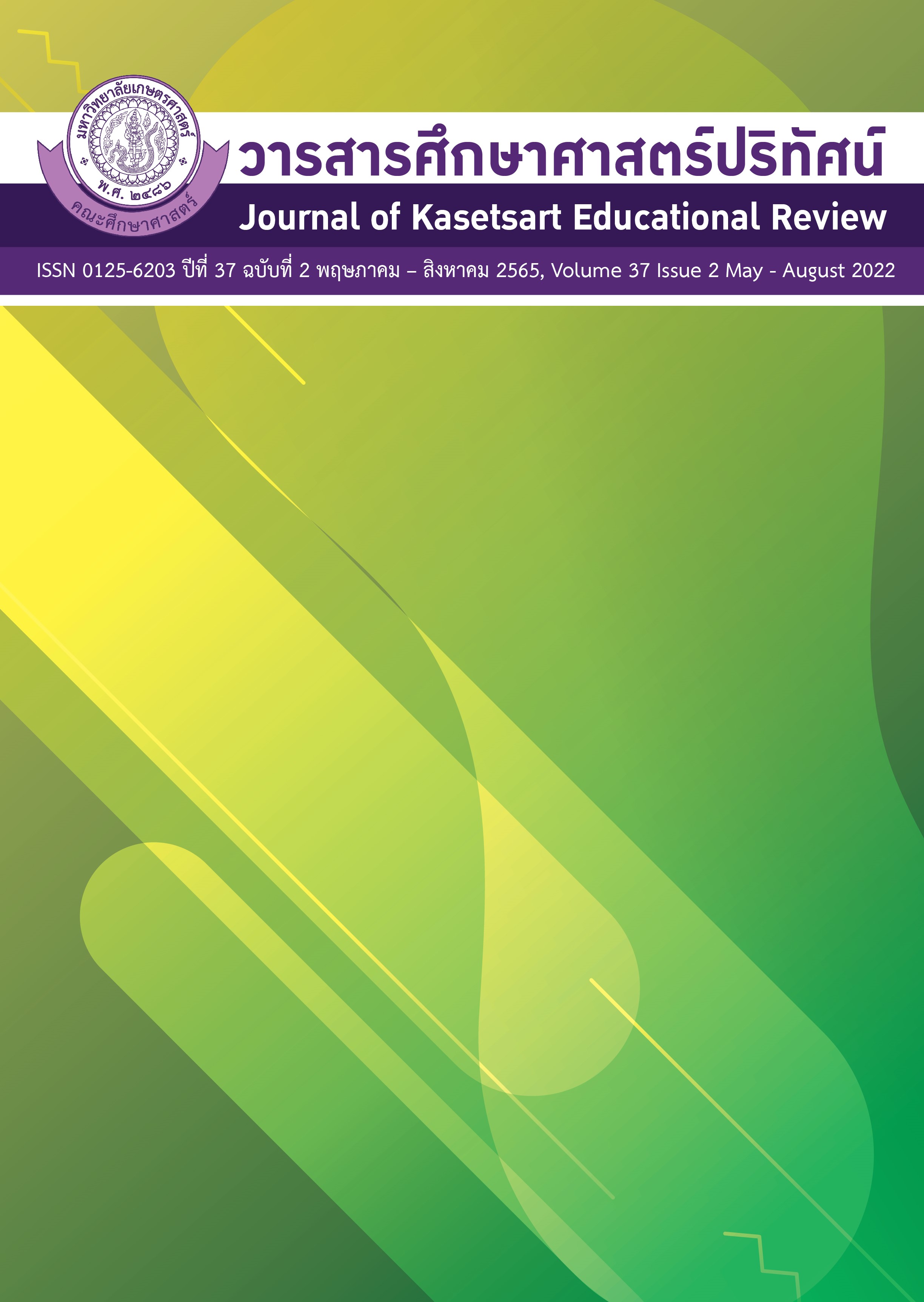ความคิดเห็นของผู้มีส่วนได้ส่วนเสียต่อความรู้และทักษะที่ต้องการ ผลการศึกษา และพฤติกรรมการหางานทำของบัณฑิตสาขาวิชาเทคโนโลยีการศึกษาแพทยศาสตร์
คำสำคัญ:
ความรู้และทักษะที่ต้องการ, ผลการศึกษา, พฤติกรรมการหางานทำบทคัดย่อ
งานวิจัยนี้มีวัตถุประสงค์เพื่อศึกษา 1) ความคิดเห็นเกี่ยวกับความรู้ ทักษะ และประสบการณ์ที่เกี่ยวข้องกับการได้งานทำของบัณฑิตสาขาวิชาเทคโนโลยีการศึกษาแพทยศาสตร์ คณะแพทยศาสตร์ศิริราชพยาบาล มหาวิทยาลัยมหิดล 2) ความคิดเห็นเกี่ยวกับผลการศึกษาจากสาขาฯ กับการได้งานทำของบัณฑิต และ 3) พฤติกรรมการหางานทำของบัณฑิต กลุ่มตัวอย่างแบ่งเป็น 3 กลุ่ม ได้แก่ 1) ผู้ใช้บัณฑิต จำนวน 24 คน 2) บัณฑิต/ศิษย์เก่า 41 คน และ 3) นักศึกษาชั้นปี 4 ของสาขาฯ 48 คน กลุ่มผู้ใช้บัณฑิตได้มาโดยวิธีการเลือกแบบเฉพาะเจาะจง (Purposive sampling) กลุ่มบัณฑิต/ศิษย์เก่า และกลุ่มนักศึกษาปี 4 ได้มาโดยความสมัครใจ (Self-selected) เครื่องมือที่ใช้ในการวิจัยคือแบบสอบถามสถานการณ์การประกอบอาชีพและปัจจัยที่มีผลต่อการมีงานทำของบัณฑิต จำนวน 3 ฉบับ ซึ่งผ่านการประเมินความตรงจากผู้เชี่ยวชาญ 3 ท่าน การดำเนินงานวิจัยมี 4 ขั้นตอนคือ 1) ศึกษา ค้นคว้าเอกสารที่เกี่ยวข้องกับงานวิจัย กำหนดตัวแปร และกรอบแนวคิดการวิจัย 2) พัฒนาเครื่องมือที่ใช้ในการวิจัยและหาความตรงของเครื่องมือ 3) เก็บรวบรวมข้อมูลวิจัย และ 4) วิเคราะห์และสรุปผลการวิจัย การวิเคราะห์ข้อมูลใช้สถิติพื้นฐาน ได้แก่ การแจกแจงความถี่ การหาค่าร้อยละ และค่าคะแนนเฉลี่ย
ผลการวิจัยพบว่า 1) ผู้มีส่วนได้ส่วนเสียทั้ง 3 กลุ่มให้ความสำคัญกับทักษะด้านศิลปะ การออกแบบ ผลิตสื่อในการได้งานทำมากกว่าความรู้ด้านวิทยาศาสตร์สุขภาพ การแพทย์ และสาธารณสุข และกลุ่มผู้ใช้บัณฑิตให้ความสำคัญกับทักษะด้านเทคโนโลยีสารสนเทศมากกว่ากลุ่มอื่น 2) ระดับผลการศึกษาจากสาขาฯ ไม่ได้เป็นปัจจัยสำคัญในการพิจารณารับเข้าทำงาน 3) พฤติกรรมการหางานโดยอาศัยข้อมูลการแนะนําระหว่างบุคคล เป็นแหล่งข้อมูลสำคัญที่สนับสนุนให้บัณฑิตได้งานทำในเวลาที่กำหนด บัณฑิตส่วนใหญ่ใช้เวลาในการเตรียมความพร้อมเพื่อสมัครงาน 1-3 เดือน และผู้ที่ได้งานทำใช้เวลาในการหางานจนถึงได้งานเป็นเวลา 1-3 เดือนเช่นกัน
เอกสารอ้างอิง
Pausawasdi N. and S. Suwuttho. (2012). Desirable Characteristics and Skills for Medical Practitioners. (Preferred Characteristics and Skills for Medical Education Technologist). Institute of Medical Education Technology Faculty of Medicine Siriraj Hospital Mahidol University Journal of Medicine, Vol.21 Junuary – December.
Kachintorn, U. (2018). Concepts and Pilicies on higher Education of Clinical Prof. Dr. Udom Kachintorn, Deputy Minister of Educaton. At the meeting to deliver policies to executives and civil servants of the Office of the Higher Education Commission (OHEC) on January 4, 2018 at the Office of the Higher Education Commission.
Ang, M. C. H. (2015). Graduate Employability Awareness: A Gendered Perspective. Procedia - Social and Behavioral Sciences, 211, 192-198. https://doi.org/10.1016/j.sbspro.2015.11.083
Cavanagh, J., Burston, M., Southcombe, A., & Bartram, T. (2015). Contributing to a graduate-centred understanding of work readiness: An exploratory study of Australian undergraduate students' perceptions of their employability. The International Journal of Management Education, 13(3), 278-288. https://doi.org/10.1016/j.ijme.2015.07.002
Fajaryati, N., & Akhyar, M. (2020). The Employability Skills Needed To Face the Demands of Work in the Future: Systematic Literature Reviews. Open Engineering, 10(1), 595-603. https://doi.org/10.1515/eng-2020-0072
Jackson, D. (2014). Self-assessment of employability skill outcomes among undergraduates and alignment with academic ratings. Assessment & Evaluation in Higher Education, 39(1), 53-72. https://doi.org/10.1080/02602938.2013.792107
McKinney, A. P., Carlson, K. D., Mecham III, R. L., D'Angelo, N. C., & Connerley, M. L. (2003). Recruiters' use of GPA in initial screening decisions- Higher GPAs don't always make the cut. Personal Psychology, 56, 823-845.
Omar, M. K., Bakar, A.R. and Mat Rashid, A. (2012). Employability skill acquisition among Malaysian community college students. Journal of Social Sciences 8(3), 472-478.
Pan, Y.-J., & Lee, L.-S. (2011). Academic Performance and Perceived Employability of Graduate Students in Business and Management – An Analysis of Nationwide Graduate Destination Survey. Procedia - Social and Behavioral Sciences, 25, 91-103. https://doi.org/10.1016/j.sbspro.2011.10.531
Pinto, L. H., & Ramalheira, D. C. (2017). Perceived employability of business graduates: The effect of academic performance and extracurricular activities. Journal of Vocational Behavior, 99, 165-178. https://doi.org/10.1016/j.jvb.2017.01.005
Rahmat, M., Ahmad, K., Idris, S., & Zainal, N. F. A. (2012). Relationship between Employability and Graduates’ Skill. Procedia - Social and Behavioral Sciences, 59, 591-597. https://doi.org/10.1016/j.sbspro.2012.09.318
Saks, A. M. (2006). Multiple predictors and criteria of job search success. Journal of Vocational Behavior, 68(3), 400-415. https://doi.org/10.1016/j.jvb.2005.10.001
Saks, A. M., & Ashforth, B. E. (1999). Effects of Individual Differences and Job Search Behaviors on the Employment Status of Recent University Graduates. Journal of Vocational Behavior, 54(2), 335-349. https://doi.org/10.1006/jvbe.1998.1665
Singh, P., Thambusamy, R. X., & Ramly, M. A. (2014). Fit or Unfit? Perspectives of Employers and University Instructors of Graduates’ Generic Skills. Procedia - Social and Behavioral Sciences, 123, 315-324. https://doi.org/10.1016/j.sbspro.2014.01.1429
Singh, P., Thambusamy, R., Ramly, A., Abdullah, I. H., & Mahmud, Z. (2013). Perception Differential between Employers and Instructors on the Importance of Employability Skills. Procedia - Social and Behavioral Sciences, 90, 616-625. https://doi.org/10.1016/j.sbspro.2013.07.133
Suleman, F., Videira, P., & Araújo, E. (2021). Higher Education and Employability Skills: Barriers and Facilitators of Employer Engagement at Local Level. Education Sciences, 11(2). https://doi.org/10.3390/educsci11020051
Surridge, I. (2009). Accounting and Finance Degrees: Is the Academic Performance of Placement Students Better? Accounting Education, 18(4-5), 471-485. https://doi.org/10.1080/09639280802008498
Tentama, F., & Abdillah, M. H. (2019). Student employability examined from academic achievement and self-concept. International Journal of Evaluation and Research in Education (IJERE), 8(2). https://doi.org/10.11591/ijere.v8i2.18128
ดาวน์โหลด
เผยแพร่แล้ว
ฉบับ
ประเภทบทความ
สัญญาอนุญาต
ลิขสิทธิ์ (c) 2022 วารสารศึกษาศาสตร์ปริทัศน์

อนุญาตภายใต้เงื่อนไข Creative Commons Attribution-NonCommercial-NoDerivatives 4.0 International License.
บทความทุกบทความเป็นลิขสิทธิ์ของวารสารคณะศึกษาศาสตร์ มหาวิทยาลัยเกษตรศาสตร์ วิทยาเขตบางเขน
วารสารศึกษาศาสตร์ปริทัศน์ (Kasetsart Educational Review)






